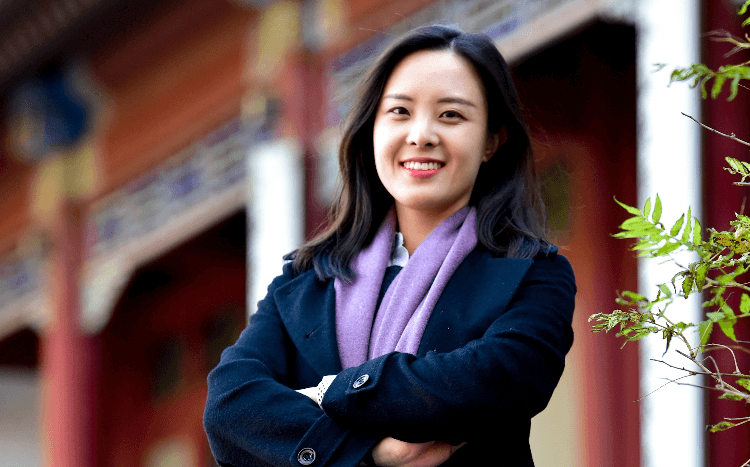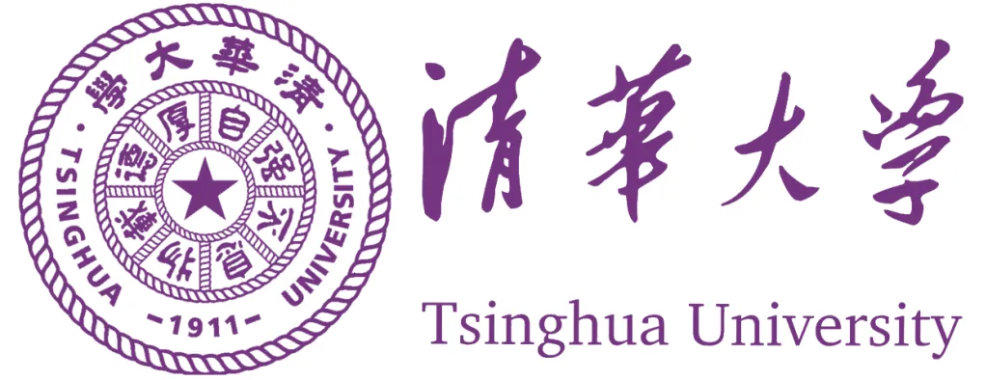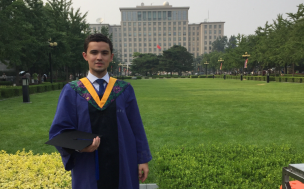These partnerships can form between business schools in regions such as Asia and the US, offering a blend of Eastern and Western perspectives on business.
The Tsinghua University School of Economics and Management Global MBA program is based in Beijing and formed in connection with M7 business school, MIT Sloan School of Management.
This means that students on the Tsinghua Global MBA program can access the career benefits of a top MBA in China while leveraging the network offered by one of the best MBA programs in the US.
We spoke with Annie Hu, a student on the program, about how she’s benefiting from the collaboration between these two business schools.
Gaining a diverse perspective on business from Tsinghua and MIT Sloan faculty
Many ambitious MBAs are motivated to forge an international career and look to global MBA programs to help their career dreams become a reality.
China is an attractive destination for such challenge-hungry students as it offers access to exciting careers across industries such as tech, finance, and consulting.
The powerhouse is renowned for its innovation in the global tech sphere in areas such as artificial intelligence and digital infrastructure.
In the Global Innovation Index 2022, China ranks 11th among 132 economies and third among countries in Southeast Asia, East Asia, and Oceania.
Looking to take advantage of China’s economic growth and launch a thriving career, Annie decided to join the Tsinghua Global MBA partnered with the MIT Sloan School of Management.
Annie was born and raised in China but emigrated to the US during high school. As an Asian-American, she explains that joining an MBA program with both US and China connections was important to helping her leverage advantages to build a global career.
“I chose Tsinghua as I couldn’t help but be attracted to the reputation and prestige of the business school. The resources, faculty, and global network you can access are unmatched,” Annie says.
To thrive in today’s international business world, leaders require essential skills such as cross-cultural management, communication, networking, and adaptive thinking to navigate the globalized business setting.
“You really benefit from a pool of experienced and knowledgeable professors,” she says.
Many of the Tsinghua Global MBA faculty have experience of living abroad in China and beyond. There are also several visiting MIT Sloan professors.
“The faculty provide a global perspective on business issues and Chinese politics,” she says.
Annie joined the MBA with around six years of work experience in the US in the financial analysis and accounting field. She wanted to join an MBA that would help her understand what it’s like to be a professional employee in China.
The Tsinghua Global MBA program offers experiential learning courses such as Integrated Practical Projects (IPP), the China Lab, and case competitions.
The China Roots Seminar, which teaches students about the Chinese business environment through guidance by industry mentors, corporate visits to management teams in Chinese companies, lectures on business and management in China by Tsinghua faculty, and guest speakers from influential Chinese business leaders.
Accessing a vast MBA network between China and the US
The networking potential at any top business school is endless. Yet joining an MBA that’s partnered with another leading business school in a different country paves the way for even greater networking opportunities.
Students on the Tsinghua Global MBA typically come from 17 different countries and regions.
“I was really looking for a program with a global cohort,” Annie says.
In each cohort, 50 Tsinghua students have the chance to travel to MIT Sloan’s campus in Boston to study MIT signature lectures during the MIT Module.
There are also many opportunities to build a professional network in China, which was important for someone like Annie who had spent most of her adult life in the US.
During the China Lab, select students from Tsinghua and MIT work on a four-month consulting project with a cutting-edge Chinese company. The project culminates in a presentation at MIT.
There are also several MBA internships that students can pursue with Chinese firms.
Many of these practical initiatives helped Annie build vital connections with companies and industry leaders as well as Tsinghua and MIT alumni.
Experiencing an action-packed MBA program
If you know anything about MIT Sloan, then you’ll already know that the business school favors practical and immersive learning.
On the Tsinghua Global MBA program, you can expect a similar level of experiential learning opportunities.
Many of the courses, including Ethics and Corporate Responsibility, offer case-based scenarios where students can dive into real-world scenarios.
“From Professor Chen, the course leader, I learned that nothing is black and white—you should always place yourself in other people’s shoes,” Annie says.
She also adds that she gained many of her learning about business from the IPP, which takes place during the second semester of the Tsinghua Global MBA program.
The project sees students work in teams of up to six to solve a business problem for a company based in China. There are around 50 different projects for students to choose from, enabling MBAs to join projects that align with their career goals.
Annie undertook a project with the Asian Infrastructure Investment Bank (AIIB) where she gave a presentation on her analysis and findings to the strategy department at the end of her time there.
“It was an amazing opportunity to liaise with a real company, have regular meetings, conduct research, and compile a presentation,” Annie says, adding that it’s helped her to understand more about the Chinese way of business.
The connections she formed at AIIB even led to her landing a top MBA internship at the same organization. The internship involved her participating in forums and international meetings about topics such as the G20 Summit in Indonesia and reaching sustainable development goals.
Benefiting from a truly flexible MBA program
The Tsinghua Global MBA offers a high degree of flexibility. In the second year of the program, students can choose whether to pursue an exchange trip with an overseas business school such as the University of Toronto, London Business School, or Indian School of Business.
Due to the flexibility of the Tsinghua Global MBA, Annie was able to take some time out to have a baby after completing the first year of the program.
“The program really allows and supports you to be flexible as a new parent,” Annie says.
Now that Annie has returned to studying her MBA, she’s more determined than ever to show that raising a family and launching a successful business career at the same time is very much possible.
“It’s definitely a challenge raising a child and studying an MBA but the flexibility of the program and freedom to choose electives and tailor the curriculum to your interests has really helped me,” Annie says.
During the program, Annie has learned about the fundamentals of business in courses such as Organizational Behavior, Data, Models, and Decisions, and Strategic Management.
Some of the most unique electives that students can choose from include Artificial Intelligence, Frontiers of Technology, Innovation, and Education, and Business Performance and Sustainability.
Attaining a global vision for your future career
Many MBA students are driven by the idea of launching a truly global career after graduating and thriving in the future business world.
Global MBA programs can help students reach their goals by providing access to career links across the world.
Due to her blended US-Chinese background, she says she’s excited about building a career at a firm with international interests.
She states an interest in working in sustainable development, sparked by her MBA internship at the AIIB, or in investment.
Whichever direction she goes, she says she feels confident about pivoting from her pre-MBA background in financial analysis and accounting to an MBA career that aligns more with her interest in global business matters.
“It’s important for me to retain a global vision of the business world while strengthening my knowledge of business in China, and learning about business and management from the Tsinghua Global MBA is helping me to reach my career and life goals in China and beyond,” she says.








